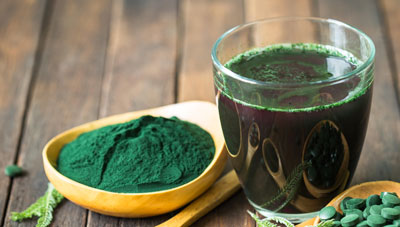Benefits and nutritional values
- Detoxifies and eliminates heavy metals and other pollutants
- Strengthens and stimulates the immune system
- Regulates the acid-base pH
- Stimulates intestinal transit and rebalances the microbiota (intestinal flora)
- Prevents and participates in the fight against bacterial infections (rhinopharyngitis, colds, etc.)
- Suitable for vegetarians

Chlorella is known for its immune system energizing properties. It stimulates cell regeneration thanks to its anti-tumor powers, not favoring the growth of cancerous cells. In addition, thanks to its immunomodulatory properties, chlorella can regulate lipid and sugar levels in the blood, thus offering protection against type 2 diabetes.
Chlorella also has impressive detoxifying properties. It has the ability to eliminate heavy metals (lead, mercury, arsenic, cadmium...), dioxins thanks to its high chlorophyll content and its chelating membrane (which associates with heavy metals), capable of fixing them. The cell membrane of Chlorella not being assimilated during its passage in our digestive system hangs the toxic compounds and eliminates them by the stools.
Moreover, chlorella contains a high level of antioxidants and prebiotics. Therefore, while balancing the microbiota (intestinal flora), it stimulates digestive and intestinal activity and solves constipation problems. As our microbiota is largely involved in our immune system through its production of neurotransmitters such as melatonin (the sleep hormone) and serotonin (the happiness hormone), we can now demonstrate that our overall health depends on its balance.



